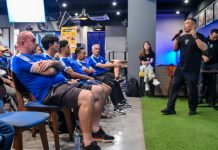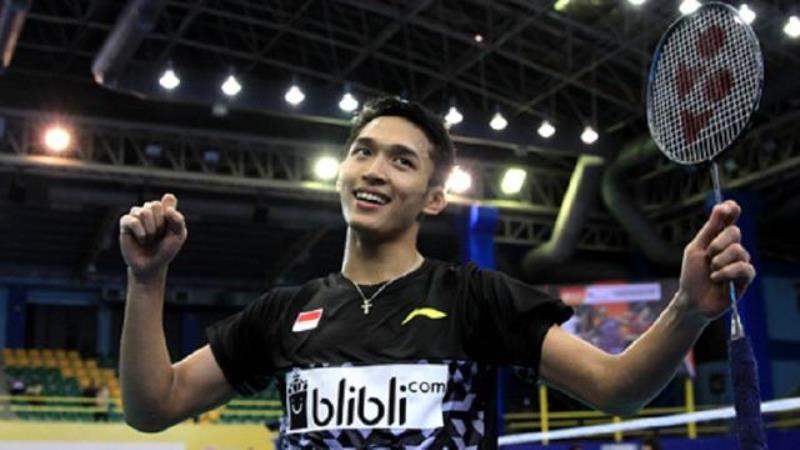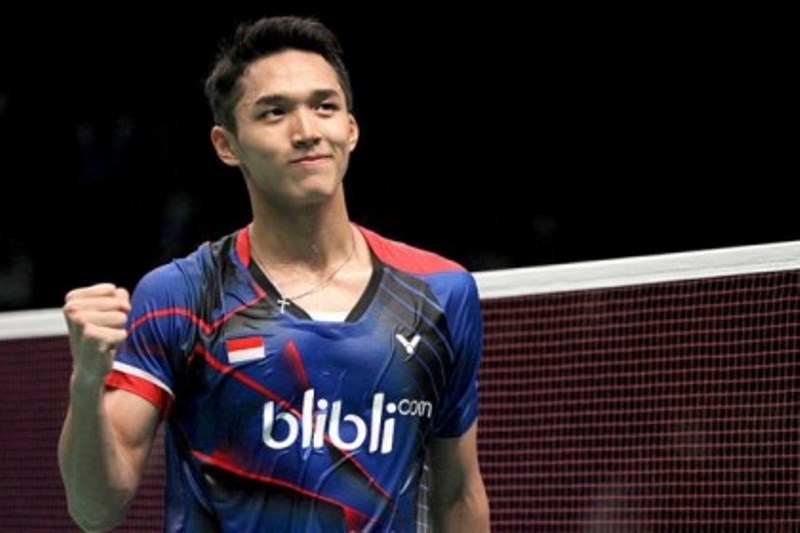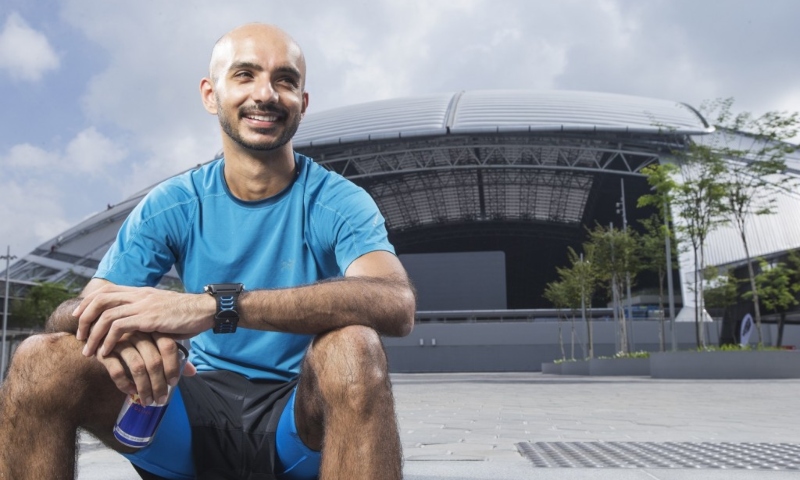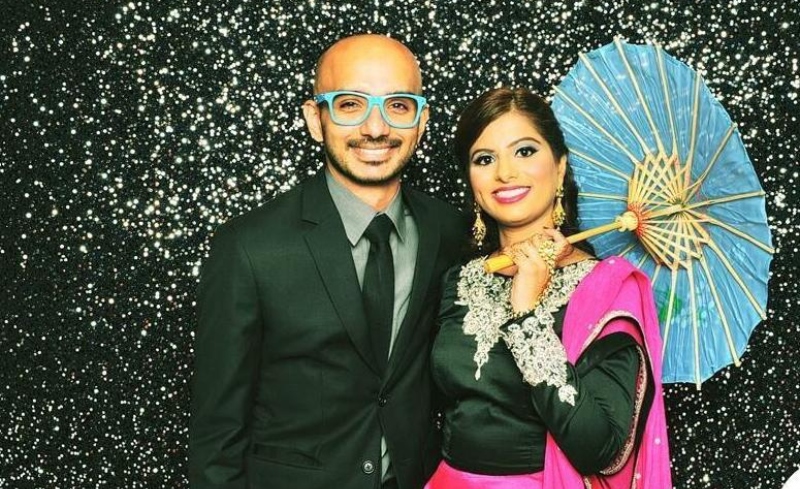
HE runs not for medals or financial fame. He runs for charity or community cause as he’s an athlete with a big heart, energy and a great attitude.
Paviter Singh is a little-known sportsman exemplary in his own heartland way as an ultra-marathon runner. Nowhere close to world-beaters like Joseph Schooling (swimmer), C Kunalan (sprinter) or Ang Peng Siong (swimmer) but he hits the road, in a rather quiet way, as he indulges in a non-Olympic recognised sport.
“I believe in the collective human spirit. As a Sikh, I do have a strong connection to my community and want to help those in need and create awareness of the benefits from running,” says 37-year-old Paviter, who adds, tongue-in-cheek, that the “biggest race this year” will be next week when he ties the knot with Jasmine Kaur, 31, a teacher at the Sir Manasseh Meyer International School (SMMIS), Singapore’s only Jewish international school in Jalan Ulu Sembawang.
He may not hog the headlines in the media but as you read this article, you’re going to like this exceptional runner and human being. His running (and winning) formula: He just believes in himself.
As a sportsman over four decades, I’ve always felt there’s a huge mental component to running long distances and wondered if Paviter, a former cross-country athlete at St Patrick’s School, has a special mantra when it comes to the enduring ultra-marathon challenges
Confidently, he says: “When the going gets tough, the tough get going, but if you’re going to run an ultra, you have to keep it in mind that it will be tough, so try not to think about it being tough at all. If you feel like it’s going to be hard, it will feel harder than it actually is.”
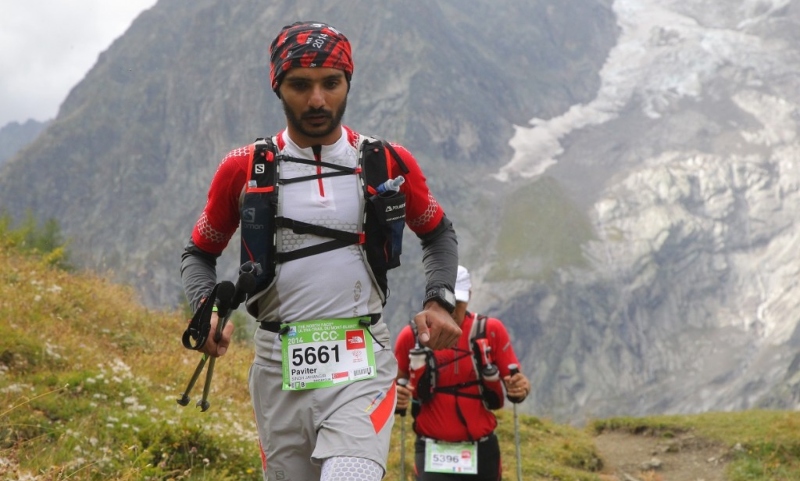
WHAT’S ULTRA-MARATHON?
First on your mind: What’s an ultra-marathon? It’s any footrace longer than the traditional marathon length of 42.195 km (26.4 miles). The most common distances are 50 km (31.1 miles), 100 km (62.2 miles), 50 miles (80.5 km), and 100 miles (160.9 km), The 100 km is recognized as an official world record event by the IAAF (International Association of Athletics Federations (IAAF), the world governing body of track and field.
Paviter, who has competed in Australia, Taiwan, Malaysia, Italy, France and Germany, says: “I’d rather not think about that and just take it as a run. I never think of a 100km run as a 100km run. I break it up into 10km or 15km bits.
“I do a lot of planning. I make a lot of charts and draw a lot of graphs so I break up the 100km into the names of different hills that I’m going to climb, so that way I don’t think about the entire distance. I have many hills to climb and I’ll just do it one at a time.”
If you don’t know Paviter, you may say he’s ultra-crazy on some big personal occasions. Some have nice cakes and nostalgic candles for a birthday, others pop bottles of fancy bubbly and party the night away. But he celebrated his 30th birthday by putting himself in pain!
Kid you not, and please make no mistake though. Paviter is no masochist, but simply a very passionate ultra-marathon runner.
He says: “I was looking for a new challenge to celebrate my birthday and to celebrate continuous change, and happened to come across [a 100-km run] that coincided with my birthday that year. Yes, 26 painful hours and 100 km later, I had been initiated into the world of ultra-marathons and haven’t looked back.”
I ask him what’re the best lessons he learnt running ultra-marathons. He replies: ‘There is a true and raw form of camaraderie in ultra-marathons that I love. I’ve made some amazing friends through races. Being out in nature and having the opportunity to run in slightly unreachable places has been [great] as well.
“I’ve learnt to become more patient and to manage my own expectations about myself and others. I think it’s made me a bit less temperamental; I don’t get overexcited about things as much as before because ultra-running has taught me it’s about thinking long-term and not short-term.”
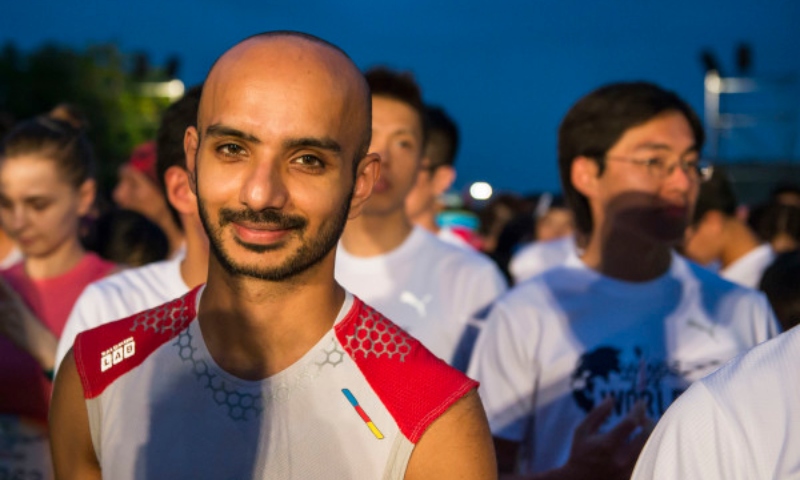
‘PEOPLE-ORIENTED FACTOR’
The “people-oriented factor” matters a lot to him and he recounts running The North Face (TNF) Australia. He says: “I was struggling quite a bit at 65km. My IT band was flaring up and someone just ran past me, I had no idea who she was, but she said, “you’re struggling, what’s going on?” and I said, “my IT band is flaring up”.
“She was a physiotherapist, and she said, “sit down, let me sort you out” and she strapped my knee up and off she went. I never got to speak to her again, but it’s that sense of camaraderie, understanding, and people helping each other in moments of need, that really struck a chord in me, because that’s what ultra-running really is about.”
The seven-letter word ‘charity’ is invincibly edged on his heart and he is prepared to run to the ground for the lesser fortunate. He cites working closely with the Singapore Cancer Society. He explains: “I decided to become a charity athlete for the Singapore Cancer Society after a family member passed away due to cancer.”
“As a charity athlete, I do engage people to try and donate for the right cause. Every year, I run the ‘Run For Cancer’ race as well. From time to time, I also give talks on how ultra-marathon running helps me in life on a daily [basis], in a hope to inspire individuals.”
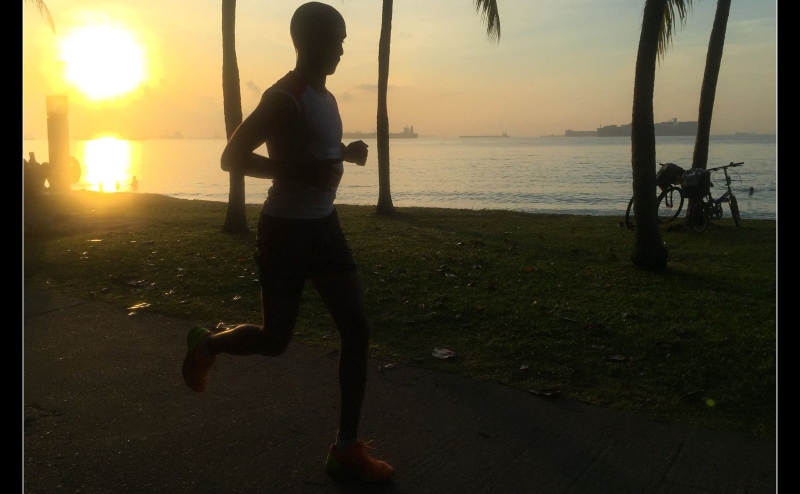
POUNDING THE ROADS
Pounding the roads is a self-sacrificing hobby for a passionate ultra-marathoner. Believe me, it’s never a bed of proverbial roses. Paviter reiterates that improving on stamina and mileage in a gradual manner is the key to experiencing an easier race and he shares his intense training schedule.
“I usually increase my training to about six days a week in preparation for any big race,” he says. “In an ultra-marathon, each race provides new challenges in terrain and weather. To train for that, the focus is a lot more on hill/stair training, balance and strength. We are exposed to elements, such as extreme heat, snow, hail and freezing cold. There is a lot of climbing in an ultra-marathon. In my last race, we had to climb 1200 metres in just the first 10 kilometres!”
Explaining the difference between the common marathon and the unusual ultra-marathon races, he says: “In an ultra-marathon, the pace of running, while important, is secondary to me. There is a lot of walking, fast hiking and negotiation through various trails and mental/physical states.
“A marathon, however, is slightly different. There is no walking and the primary focus is to maintain a strong pace. Two very different approaches with varying degrees of difficulty. Both are very different sports, just like how rally driving and Formula 1 racing are.”
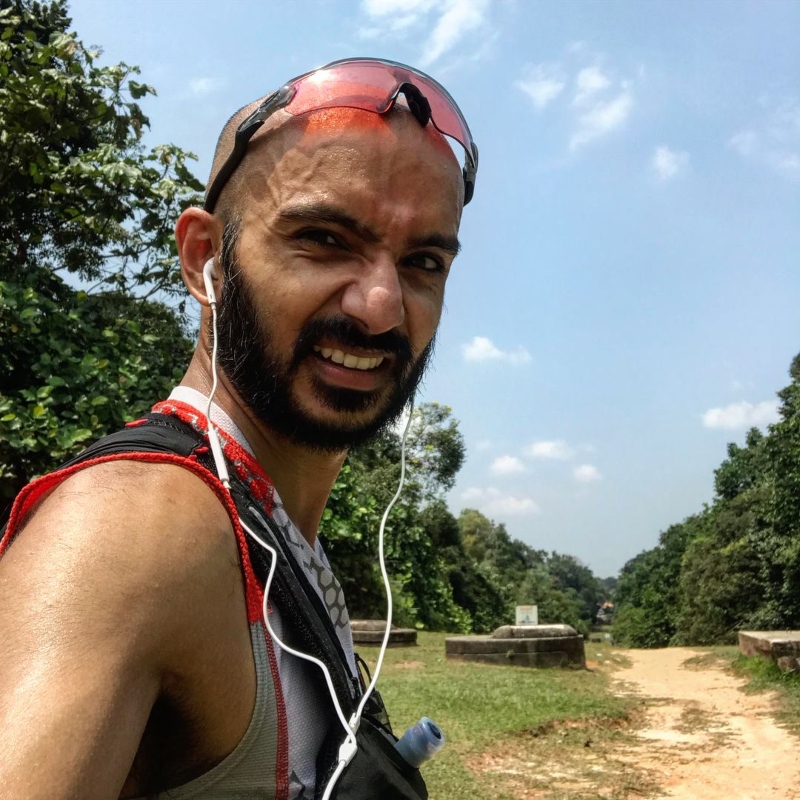
MOST MEMORABLE RACE
I was curious to know of his most memorable race.
He gives a cheeky wink and replies: “Can I say all of them? If I had to choose one, it would probably be The North Face Australia 2014. This was the second time I ran this race. In 2013, I fell ill at the 65km mark and finished in 20 hours, five minutes. I was gutted and set out to train for a full year, so in 2014, everything went according to plan. I ran my race in 16 hours, nine minutes. Reducing my timing by four hours was very memorable.”
Smilingly, he says competing internationally on the ultra-marathon circuit “gives you back some faith in humanity”. He explains: “I definitely feel more human because of it. Some of the stories I hear of why people do ultra-running is also quite moving. There was this guy in a race whose leg was broken, and he knew it was broken but he still ran 100km to raise the funds for his child suffering from cerebral palsy. Sentimental stories like that move me so much.”
He vividly remembers his first Sabah Adventure Challenge in 2011. He says: “It was my birthday that November and you might say it was a gift I gave myself – a new challenge. How did I do? I tell friends that I stumbled the entire distance, but I finished.
“The rest, as they say, is history. The sheer sense of adventure, the unknown drew me to this sport. Before then, I ran road races, but something was always missing. I found that puzzle piece when I ran my birthday Ultra in 2011.”
DIGITAL WORLD
Career-wise, he’s Head (Courses) at Hyper Island, where he’s constantly thinking about how all things digital impact our world. I ask him if he mixes the digital world with physical running to achieve balance or does he have a hard time reconciling the two worlds?
“My world does revolve around all things digital because my job involves looking at how digital affects our lives and how we deal with change,” he says. “I believe in life-long learning, which is very compatible with ultra-marathon running. I’m always learning; a desire and passion for learning and getting out of that comfort zone drives people like me.
“A good example of this is my enthusiasm for social media which enables me to stay in contact with the Singapore running community. Sharing stories online deepens our friendships.
Since ultra-marathoners are a growing community here, what’s the enduring advice he wants to give the younger generation contemplating ultra-marathon distances? Smartly, he says: “I feel that ultra-marathon running is the most accessible sport in the world. I think anyone can do it. It’s more mental than physical; I’ve seen 80-year-olds doing it.
“The aim is not to think about the distance. Think instead about the journey, and what you learn from it. It’s not about speed at all. It’s about understanding yourself it’s about pushing through boundaries.
“That’s a mentality applicable to life in general as well – what’s the hurry? Take a step back, listen to people around you, and then make a decision. What I’ve learnt from ultra-running, I’ve applied to other areas of my life and work as I see lots of parallels”
To the first-timers, who’re keen to go the extra mile, Paviter’s value-add advice: “First of all, enjoy your surroundings, and soak in the environment. Also, be positive – not just in running but in life. In ultra running, just like life, nothing ever goes as planned. A positive mindset will get you through that.”
“Train for specifics too – hill training and building muscle strength are important. Also, it helps to break large distances into smaller and mentally digestible parts. Finally, walk whenever you have to.”
As he winds down the interview, Paviter admits that ultra-marathon running has given him the “best reality check that I have needed…it has made me realise my strengths, brought me down to my knees at my weakest moments and has made me push through my comfort zone to maintain a positive mindset, no matter what happens”.
I believe him. There is a form of suffering involved, of course. It does hurt at times. But not always. Afterall, as Singaporeans we can do the extraordinary, without serious thoughts to money, fame or medals.
Yes, the little-known Paviter has shown that we’re not super-humans. We are not mad. We just need to be human and have the passion to run to help the charity and/or community. – By SURESH NAIR
- Suresh Nair is a sports journalist who salutes Paviter Singh and believes that ultra-marathon running is one of the most accessible sports in the world. You don’t have to be a “super-fit” person to run an ultra-marathon. You need a very passionate Paviter Singh-heart!





